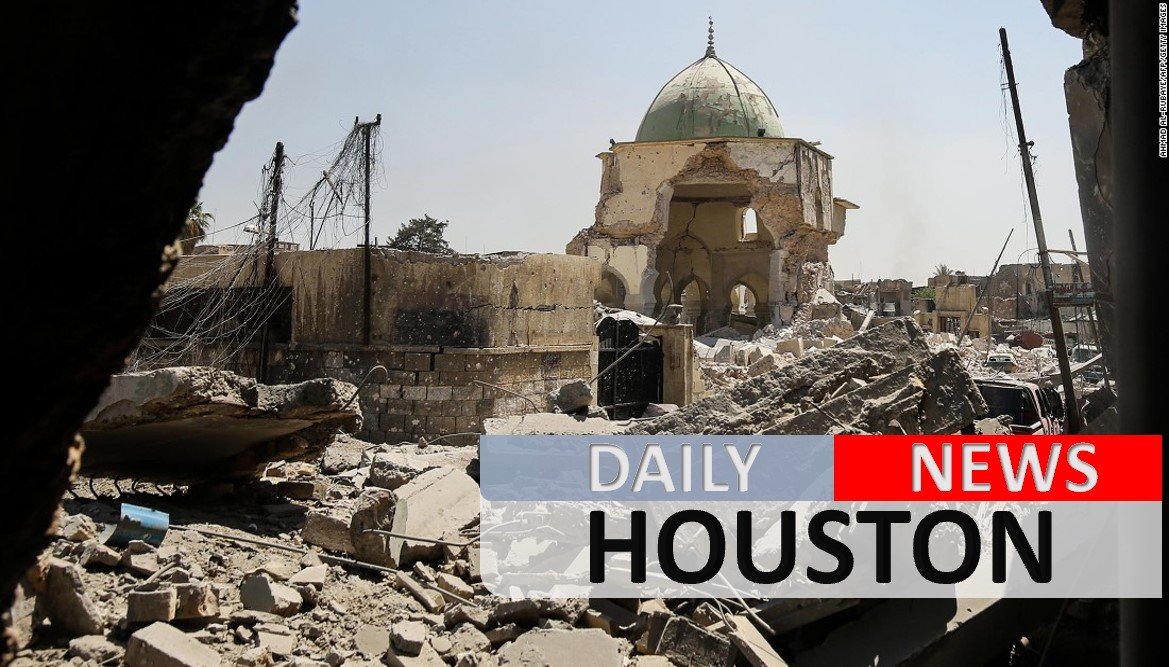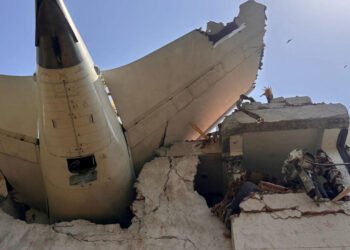Iraq’s military has seized the remains of the Great Mosque of al-Nuri — where Abu Bakr al-Baghdadi declared the ISIS “caliphate” in 2014 — and is now engaged in fierce street-to-street fighting for the last several hundred meters of Mosul’s Old City.
Troops are just 600 meters from the Tigris River, which marks the final few blocks of western Mosul still under ISIS control.
The mosque was destroyed by ISIS fighters last week as Iraqi forces edged closer.
“The fighting is heavy but our advance is strong,” Brigadier General Haider Fadl of Iraq’s counterterror service told CNN Friday. “The difficulties are mainly due to the presence of civilians and the terrain. The houses are tight-knit and the streets are too narrow for our vehicles.”
ISIS militants are using small arms fire, snipers, mortars and grenades. At least four ISIS militants also blew themselves up near the frontline Thursday, including one woman who blew herself up near Iraqi forces on Thursday morning.
A team of reporters, who were embedded with Iraqi units during the fierce battle with ISIS on Thursday afternoon before the mosque had been secured, said it appeared some progress has been made overnight.
The capture comes a day after US coalition forces predicted the operation could be complete within days. But commanders have warned it will take time to clear the regained areas of booby traps and explosives left behind by militants.
‘Forces will bring victory’
The central government in Baghdad is under political pressure to announce the end the operation even as bitter fighting continues on the ground. On Thursday, Iraqi Prime Minister Haider al-Abadi claimed victory and vowed to hunt ISIS until every last member is killed or brought to justice.
“We are seeing the end of the fake ‘Daesh’ state, the liberation of Mosul proves that,” Abadi said on Twitter, referring to ISIS by another name. “We will not relent, our brave forces will bring victory.”
Only a “couple of hundred” ISIS fighters remained in Mosul earlier this week, the coalition said.
Once ISIS has been driven out, Iraqi military will still face the challenge of dealing with the terror group elsewhere in Iraq. It still controls cities in Kirkuk, Nineveh and Anbar provinces, including Hawija, Tal Afar, Qaim, Ana and Rawa.
Hundreds of residents flee
Amid the ferocious battle, around 300 to 400 civilians fled the Old City on Friday.
Fighting has caused significant displacement from the city, where approximately 100,000 civilians remain. More than 742,000 people have left Mosul and surrounding areas since the offensive began, according to an Iraqi government statement a month ago.
Civilians left behind ISIS lines lack access to clean water and medicine, and many have limited access to food, the United Nations has said.
Thousands of children remain trapped in western Mosul, Peter Hawkins, UNICEF’s representative in Iraq, said Thursday. “Children are facing multiple threats to their lives. Those stranded in the fighting are hiding in their basements, fearful of the next onslaught.”
Hawkins added, “Those who try to flee risk being shot or wounded. Hundreds of civilians have already been reported killed and used as human shields.”
And as Iraqi Security forces close in, the UN says it is seeing an “alarming rise in threats, specifically of forced evictions of those suspected of being ISIS members or whose relatives are alleged to be involved with ISIS.”
In a statement on Friday the UN Commissioner for Human Rights said it was extremely concerned at the situation of civilians in Mosul. It called on the Iraqi government to take action to halt “such imminent evictions or any type of collective punishment.”
The UN says it has received reports of “so-called night letters left at families’ houses or distributed in neighborhoods, including in Sharqat in Salahadin Governorate, Al Heet City in Al Anbar and Al-Qayyarah in Ninewa Governorate, as well as in Mosul City.”
It added: “Illegal forced evictions are acts of vengeance that are detrimental to national reconciliation and social cohesion.”









